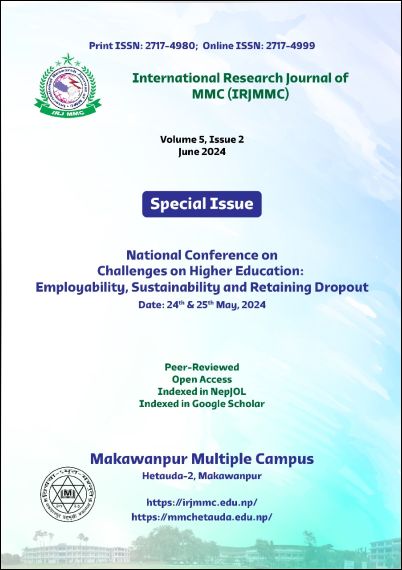Leadership Style as a Predictor of Conflict Managing Style through Faculty Members in University Colleges of Kathmandu
DOI:
https://doi.org/10.3126/irjmmc.v5i2.67741Keywords:
Transformational leadership, Faculty members, Educational institutions, Social impact, Conflict resolutionAbstract
This study examines how transformational and transactional leadership styles predict conflict management techniques through faculty members at university colleges in Kathmandu. By identifying effective leadership practices, the study aims to improve conflict resolution and foster a collaborative academic environment. A descriptive and correlational research design was used, with data collected from university colleges in different parts of Kathmandu. The total sample size for data collection was 125 faculty members. Out of which, the data of 100 respondents was used for analysis. The Likert scale questionnaires were distributed to the different 20 colleges in Kathmandu in the year 2023. Reliability was confirmed with a Cronbach's Alpha of .739, and validity was ensured through expert review and factor analysis. The findings revealed mixed opinions on conflict inevitability in educational institutions, with "The students of this institution also show progress in their professional fields in future" scoring 4.20 with a standard deviation of 0.725, indicating strong agreement. some agreement on the administration's capability to meet current requirements and moderate agreement on the creation of a conducive study environment. Opinions varied on transaction facilities and timely salary payments. There was disagreement on resolving conflict through strength, while mutual concessions and joint exploration were seen as effective strategies. The study concluded that leadership styles significantly influence conflict management, enhancing conflict resolution and promoting a cooperative academic atmosphere. The research is useful to the leaders of the university colleges for the management of conflicts.
Downloads
Downloads
Published
How to Cite
Issue
Section
License
Copyright (c) 2024 The Author(s)

This work is licensed under a Creative Commons Attribution-NonCommercial 4.0 International License.
This license enables reusers to distribute, remix, adapt, and build upon the material in any medium or format for noncommercial purposes only, and only so long as attribution is given to the creator.

